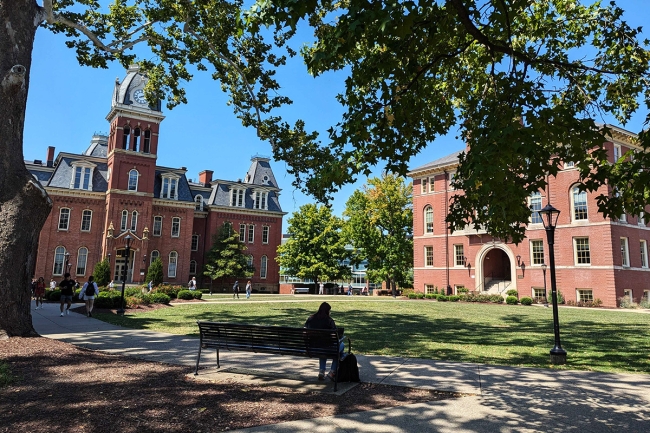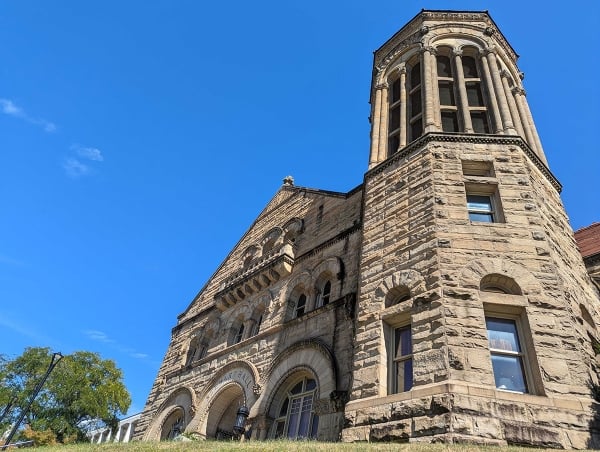You have /5 articles left.
Sign up for a free account or log in.

West Virginia University’s slashing of faculty positions and academic programs last year drew national attention.
Ryan Quinn/Inside Higher Ed
MORGANTOWN, W.Va.—It’s been almost a year since the West Virginia University Board of Governors voted to eliminate 143 faculty positions and 28 academic programs, including all foreign language and math graduate degrees, from its flagship Morgantown campus. About 8 percent of WVU’s majors disappeared in that vote.
Dozens of tenured professors were among the employees forced out. And as the fall semester gave way to spring, and concerns about future enrollment and finances continued, it became clear that those wouldn’t be the only losses. More professors announced they were departing of their own accord, and more still are on their way out.
National controversy over the slashing loomed over the start of WVU’s 2023–24 academic year. Unlike the smaller institutions whose previous layoffs and degree cutting barely made the mainstream media, this was a flagship public university, with a top R-1 Carnegie classification for research universities, gutting programs and telling professors to clean out their desks even if they had tenure.
WVU administrators cited a budget deficit in defending the cuts but denied there was a budget crisis. The cuts foreshadowed others that came to major universities as the academic year progressed.
The administrators didn’t reveal how deeply they planned to cut until the week before fall 2023 classes began. Faculty members and students quickly organized to try to stop them.
The West Virginia United Students’ Union staged protests against the cuts using megaphones and icons from WVU’s coal-mining unionization history. WVU’s rarely convened University Assembly voted 797 to 100 to express no confidence in President E. Gordon Gee, and that group of faculty also asked for a freeze to the administration’s so-called Academic Transformation plan. Major U.S. scholarly groups joined the condemnation.
On the day before the board’s scheduled vote on the cuts, around 200 students, faculty members and others filled the Erickson Alumni Center for roughly three hours of often-emotional public comments on the cuts. “There is no future for me at an institution run with such callousness, such incompetence and such reckless disregard for its own employees,” Christine Hoffman, assistant chair of the English department, told the board. “I wonder who you think is gonna stick around to do that work in this environment that you’re creating?”
But current and former university leaders, backed by top state politicians, defended the recommended cuts, pointing to declining enrollment and a goal of creating “a more focused academic portfolio aligned with student demand, career opportunities and market trends,” as they put it in an “Open Letter from WVU to the People of West Virginia.” And, on Sept. 15, just about a month after the administrators revealed their proposed cuts, the board voted to approve almost all of them.
National media attention died down, but job cuts—and voluntary faculty departures in addition to them—continued throughout the academic year.
With another fall semester beginning, things are quieter on the surface. WVU leaders don’t face the same national scrutiny, student protests or disrupted board meetings. On a sunny afternoon last week in Morgantown, students lingered outside the Mountainlair student union, perusing apples and other items at a campus farmers market. Where student protest leaders once stood with a megaphone denouncing the cuts, a Christian preacher now held a sign reading “Repent or Perish.” He told students that drinking and “having sex with Tom, Dick and Harry” will lead to their eternal destruction; they simply walked by him.
University spokeswoman April Kaull, who answered Inside Higher Ed’s questions via email (WVU didn’t provide interviews with administrators), said enrollment numbers won’t be released until next month, so it’s unclear what effect the layoffs, program cuts and attendant national controversy may have had on that source of revenue. But what is clear is that the university remains in flux: It’s not just faculty members who continue to leave, but top administrators, too.
Professors and students worry about additional cuts and departures to come. “When you understand the whole story,” said one faculty member, “who would stay unless they couldn’t leave?”
Eyeing the Exits
The university hasn’t released figures for how many faculty members have voluntarily left the university atop its forced Academic Transformation cuts. Some faculty members crowdsourced a spreadsheet that lists 38 unnamed faculty members who got new jobs after Academic Transformation and who only started looking elsewhere because of it.
Five law faculty positions were cut as part of Academic Transformation, but an additional seven faculty decided to leave, the Daily Athenaeum student newspaper reported in April. And more departures are coming.
The College of Law dean didn’t provide Inside Higher Ed an interview, and Kaull wrote that “attrition at the end of the 2023–24 academic year has not significantly impacted” that school's curriculum. But even before the Academic Transformation cuts, the law school expressed serious concerns about losing faculty, according to its written appeal to stop the cuts.
The document, provided to Inside Higher Ed on condition of anonymity, said, “Our faculty has declined in numbers by 38 percent between 2014 and now,” despite just an 8 percent decline in enrollment. The school noted it faces the start of a new bar exam and an accreditation visit in 2026.
“Any reduction in faculty on this timeline, on top of substantial losses already experienced in the recent past, imperils our ability to meet these and other accreditation requirements,” the school said.
Some current and former law professors told Inside Higher Ed that the university’s layoffs made them head for the exits. “They have slashed us from a high of 43 [faculty members] before the pandemic to we’re down to under 20, and then they expect us to deliver the same services, but there’s only so much a person can do in 24 hours, seven days a week,” said one faculty member who decided to leave last academic year.
“I was afraid that I would be cut,” said the former faculty member, who requested anonymity. “There was no such thing as tenure protection anymore because tenured faculty were being cut, and it was unclear [why] they were.”
WVU—the largest university in the only state entirely within Appalachia—has also stopped offering an Appalachian studies minor, but not because the university intended to cut it during Academic Transformation. WVU spokesperson Kaull wrote that “from the Provost’s Office’s perspective, the minor could have continued,” but Travis Stimeling, who oversaw it, “initiated its deactivation.” Kaull said the university is “in the process of developing a plan to reactivate the minor.”
Stimeling, who founded the program, died in November. But Rosemary Hathaway—a professor emerita of English and a former teacher of Appalachian studies courses—said Stimeling “was the last person who would have wanted to get rid of the Appalachian studies minor.”
Hathaway provided a May 2023 email from Stimeling—months before the board voted that fall to approve the major Academic Transformation cuts—in which Stimeling cited “changes in our faculty and ongoing budget restrictions” for a “pause” in admitting new students to the minor.
“This pause is temporary, we hope, and is currently planned to last during AY [academic year] 2023–24,” Stimeling wrote. But reviving it now, Hathaway said, is “going to be trickier … a lot of people who taught the classes that were part of that minor aren’t at WVU anymore.”
She’s one of them: Hathaway said she retired from WVU in response to the Academic Transformation cuts, partly to save positions for others and partly because she was planning to retire anyway and could get severance. But now her classes aren’t offered.

Stewart Hall houses WVU administrators.
Ryan Quinn/Inside Higher Ed
Multiple faculty members who were involved in Appalachian studies have left WVU, including Kirk Hazen, the longtime director of the West Virginia Dialect Project. “Should the Eberly College [of Arts and Sciences] wish to reinstate the program, the university would support that,” Kaull said.
Ann Pancake, a former Appalachian writer in residence at WVU, said in an email that the Appalachian studies minor is gone because “most of the faculty with expertise in that area left the university” and WVU now “has no Appalachian writers on faculty.”
Half of the English department faculty, which housed Appalachian studies faculty members, is gone due to mandatory or voluntary departures, according to Rose Casey, an assistant professor of English. “Those who remain end up with vastly more administrative/service tasks,” Casey wrote on X. Hathaway said she didn’t think half the department left, but “it was certainly close to a third”—at least a dozen full-time faculty members. She said she thinks the cuts “made people more eager to look for other jobs and to take them as they found them.”
The English department chair didn’t respond to Inside Higher Ed’s questions about his department’s losses. Kaull didn’t clarify how deep they were, but said, “We are not aware of staffing levels impacting the English department’s functioning.” Hathaway, on the other hand, thinks the department is in danger of losing its doctoral program next.
But the most prominent exits may be from the administration itself. Gee had already announced in August 2023—days before revealing his recommended cuts—that he planned to retire in 2025. In October 2023, the month after the board approved the cuts, WVU announced the departure of Rob Alsop, a vice president who served as a face of the proposed cuts (he once appeared before state lawmakers with a presentation slide reading, “Rumors of Our Demise Have Been Greatly Exaggerated”).
This past summer, WVU announced that Maryanne Reed had chosen to step down as provost at the end of this month ahead of her retirement. And, on Aug. 27, Clemson University announced it had hired away Sharon Martin, WVU’s chief marketing officer and vice president of university engagement.
“No one was forced out,” Kaull said. “All decisions were their own for their own personal reasons.”
These leadership changes add to uncertainties about where the university is headed, said Jennifer Ripley Stueckle, an untenured biology teaching professor. “I think the speed by which the provost left was surprising—not sticking it out through an academic year was surprising,” Ripley Stueckle said. She said the people responsible for the Academic Transformation “are not going to be here to support us in building whatever they created, or putting the pieces back together.”
While administrators who pushed the controversial transformation are leaving, the faculty elected one of Gee’s most strident and vocal critics to become Faculty Senate chair: Scott Crichlow. The associate political science professor will take that position—and, by virtue of it, join the university’s board—in fall 2025. “The position of the faculty at WVU seems vastly more at risk than it did when I started being a senator in 2017, and so that partially had an effect on my willingness to run,” he said.
The university isn’t just cutting programs without adding any. Kaull listed more than a dozen new majors the board has approved over the last 18 months. But they underscore WVU’s change: Only one new degree is in the humanities.
When Tenure Doesn’t Matter
Compared to last academic year, when a chorus of WVU faculty members spoke out against the cuts, public criticism is now more subdued.
“We’re even afraid to question where we’re going, what’s the objective, what we’re supposed to do,” Ripley Stueckle told Inside Higher Ed. She said faculty members are keeping their heads down for fear of attracting attention. “Your performance doesn’t necessarily dictate anything,” she said. “If you’re part of their plan [for cuts], then there’s nothing you can do to stop that.”
Kaull told Inside Higher Ed “the university has not, and won’t in the future, retaliate against faculty, students or staff for exercising their rights under the First Amendment.” But faculty members are exercising caution.
A faculty member in the School of Mathematical and Data Sciences, who wished to remain anonymous due to fear of possible retaliation, expressed worries about “future cuts, because this happened once.” The faculty member said, “We never expected to lose the graduate math programs in an R-1 school,” and “now, anything is possible—that’s what we feel like.”
“So many people had farewell gatherings that we attended; they left one by one,” the faculty member said, adding that more are looking to leave.
We’re even afraid to question where we’re going, what’s the objective, what we’re supposed to do.”
—Jennifer Ripley Stueckle, biology teaching professor
Sean Lawrence, a nontenured assistant history professor, said he’s interviewed faculty members and students as part of an “oral history project” of the cuts. “It was [a] really hard and very dispiriting, I guess, year,” Lawrence said. “A lot of our friends, people’s spouses were fired, and there was just a general sense of powerlessness.”
WVU axed Jared Sims, a tenured associate music professor and director of jazz studies, as part of its program cuts. Sims said he relocated to Boston along with his wife, a faculty member who wasn’t forced out but felt her job was precarious. “A lot of people have left, and there’s not an acknowledgment of that,” Sims said.
One of the remaining world languages professors, who wished to remain anonymous for fear of retaliation, said that “within a year you can cut everything, but it will take decades to rebuild, and the thing—the most difficult thing—to mend is the trust.” The faculty member said, “I don’t trust that my job is safe because of what happened.”
Crichlow, the future Faculty Senate chair, said, “Folks don’t have a sense of security that WVU is going to be what WVU has been,” so they’re more likely to be looking for jobs elsewhere. He said, “The level of concern remains very, very, very high.”
Adding to the concern are continued worries over enrollment. WVU administrators pointed to low enrollment in the programs it cut last academic year, and further drops could be the harbinger of more cuts.
Cautious Optimism
It’s possible that other factors, such as WVU’s relatively good football season and bowl game win last academic year, might have shored up the university in students’ eyes.
Some won’t have the option to stay, however, if they want to keep pursuing their chosen disciplines. Solomon Clark, a “super senior” in applied math at WVU, was considering staying at the university for grad school. But that’s now impossible, because the math grad programs are gone.
“It would be nice to still be able to go here, because I still have an apartment here, all my friends live here, all that type of stuff,” said Clark, who plans to attend Marshall University, a rival public university in West Virginia. He said, “To think that math, which is such a core part of so many different other disciplines in the university, is getting cut off—I don’t understand it.”
On campus last week, a group of what looked like five male students—at least three were shirtless—drove by the student union in a car. One screamed out the lyrics to Bob Marley’s song about not worrying and being happy and everything being all right.

Students walk outside WVU’s Mountainlair student union Thursday.
Ryan Quinn/Inside Higher Ed
Freshman dance major Cariann Missling sat at an outside table not far from the picturesque Woodburn Hall, which forms the central campus quad. Missling said she came to WVU despite hearing about the cuts. “I just didn’t think it would really affect me that much,” she said.
Missling said she loves her major and noted how many other majors WVU still offers: over 300. “I feel like that’s still a very wide variety, and they still have a bunch of minors to choose from, too,” she said.
She’s from the state’s Eastern Panhandle and said she likes being able to pay in-state tuition. “And, you know, it’s a party school, so that’s what a lot of people come here for,” Missling said. “When you live in West Virginia, and they have what you want, it’s the price that you want and it’s fun, it’s kind of like a no-brainer, in my opinion.”
WVU is still the biggest university in the state, still an R-1. Some faculty members, including Lawrence, the history professor, referenced a sense of “cautious” optimism around the fact that the university is searching for a new president.
Ripley Stueckle, the biology professor, also pinned some hope on the presidential search. She said she recently took her son on tours of West Virginia universities, and WVU was still “by far superior.” She said, “I don’t want that to go away. I want our flagship school to stay WVU.”
Hathaway, the former Appalachian studies teacher, had taught West Virginia folklore and folk life. Hathaway said that, in the last of her 17 years teaching at the university, she realized she had been trying to get students to realize “this is a culturally rich, fascinating, alive place—not all the good things were in the past and not all the good things are somewhere else.” That was important, she said, at a time when “the whole world tells you that this place is nothing but a place for extraction, and that the best thing you can do for yourself is to get out of here.”




